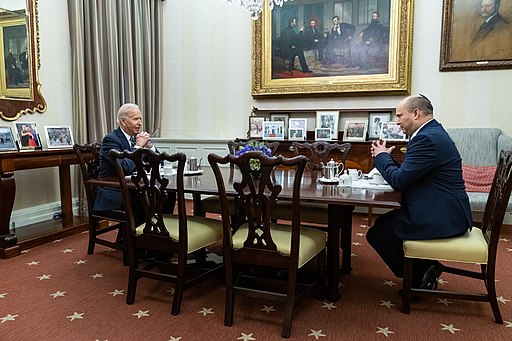The White House, Public domain, via Wikimedia Commons
While top Israeli officials focus their attention on the future of the Iran nuclear deal, another, more subtle threat emanating from much farther east than Tehran is growing in the region, according to Vice Admiral (ret.) John Bird, Erielle Davidson and Ari Cicurel of the Jewish Institute for National Security of America. Israel and the US must check the ambitions of Beijing, they argue below, and with an unusual weapon: oversight.
When President Joe Biden and Israeli Prime Minister Naftali Bennett met last week, US attempts at reviving the Iran nuclear deal topped the agenda – and it was clear the two leaders still do not see eye to eye. But beyond Tehran, there’s another area of growing geopolitical concern that could offer an opportunity for mutually beneficial, and much needed, cooperation between the U.S. and its Middle Eastern ally: countering China’s activity in the region and inside Israel itself. To address the security challenges posed by Beijing, Washington and Jerusalem should and must work together, economically.
The threat that Beijing poses to Israel is acute. Iran, China, and Russia recently announced they will hold joint maritime exercises in the Persian Gulf in either 2021 or 2022, shortly after a spate of purported Iranian attacks on ships in nearby waterways, including several against vessels tied to Israeli-owned companies. In March 2021, Tehran and Beijing announced a twenty-five-year “Comprehensive Strategic Partnership” to increase their economic and security cooperation, alarming Iran’s adversaries throughout the Middle East. Just last month cybersecurity company FireEye accused Chinese hackers of launching a massive long-term spying operation against public and private sector infrastructure and tech firms to steal intellectual property in Israel, as well as in several other countries.
In addition to tightening its ties with Israel’s rivals and going on the offensive in cyberspace, China has made repeated attempts to inculcate Israel into its growing network of subservient countries by investing directly into critical Israeli infrastructure and other sectors of the Israeli economy.
While most attention has focused on a Chinese company’s construction and operation of a terminal at the Haifa port, near where U.S. Navy ships dock, the challenge is much broader. Chinese companies with ties to the defense industry have constructed railway, tunnel, and other major infrastructure projects, while Beijing has sought to buy sensitive Israeli technologies and acquire the companies that develop them — raising the potential for intellectual property theft.
In June, Biden signed an executive order expanding Trump-era sanctions on firms with connections to the Chinese defense industry. Yet some of these companies continue to construct major infrastructure projects in Israel. CIA director Bill Burns reportedly expressed U.S. concerns about Chinese involvement in Israel directly to Bennett on a recent visit.
China’s history of geo-economic exploitation should provide a sharp warning to Israel that the intentions of Beijing are anything but benign and pose a direct threat to both Israeli and U.S. security interests. Furthermore, in light of the United States’ growing retrenchment from the region — as evidenced by its roughshod exit from Afghanistan — the primacy of Israel in securing and preserving relative stability in the region will only continue to grow.
Thus, given Beijing’s recent overtures and ongoing pattern of threatening behavior, the Biden and Bennett administrations should prioritize economic and security collaboration to counter the emerging China threat. As outlined in a report earlier this year by the Jewish Institute for National Security of America (JINSA), various opportunities of cooperation between the United States and Israel exist when it comes to countering China, but capitalizing on them requires both coordination and creativity.
The security component would largely consist of improved intelligence sharing between the two nations, which is already extremely close but should continue growing to face their shared national security challenges.
Meanwhile, the economic component would involve America encouraging and assisting Israel to create mechanisms for reviewing both inbound investments and outbound commerce.
Currently, Israel does not have a formal mechanism for reviewing foreign direct investments. The US government’s robust Committee on Foreign Investments in the United States (CFIUS), however, remains the gold standard for review of U.S. business transactions involving at least one foreign entity. Thus, the U.S. is well-positioned to offer instrumental assistance to the Israelis in constructing an effective oversight regime. Such an Israeli entity could have, for example, closely examined Chinese investments into the Haifa Port or Ashdod Port.
Similarly, the US might also consider encouraging Israel to join several of the four multilateral export control regimes geared towards monitoring the trade of critical technologies. In exchange for such commitments, the U.S. might offer annual tier 1 Special Trade Authorization (STA-1) status to Israel, which would provide the country with access to various critical exports without special licenses.
Such oversight regimes present costs – namely complicated regulation procedures and the loss of potential funding sources. [LF7] The US should seek inventive ways to help fill the possible gap left by reduced foreign investment. Such methods might include expanding US and international financing for Israeli infrastructure projects; enabling further US government investment into the Israeli tech sector; updating the US-Israel Free Trade Agreement (FTA), particularly via the addition of a formal Bilateral Investment Treaty chapter; and promoting joint US-Israeli R&D projects in the technology space. These mechanisms would undoubtedly benefit US investors.
The partnership is symbiotic. In an economic and technological competition with China, the US will benefit from Israel’s cutting-edge research and development — and from keeping that technology out of Chinese hands — while Israel relies on US investment and support to maintain the freedom and vitality of its economic engine.
For the benefit of both countries, the time to improve the collaboration against the China threat is long overdue.
Vice Admiral (ret.) John Bird commanded the US 7th Fleet and co-chairs the Israel-China Policy Project at the Jewish Institute for National Security of America (JINSA). Erielle Davidson and Ari Cicurel are senior policy analysts at JINSA.
Originally published in Breaking Defense

